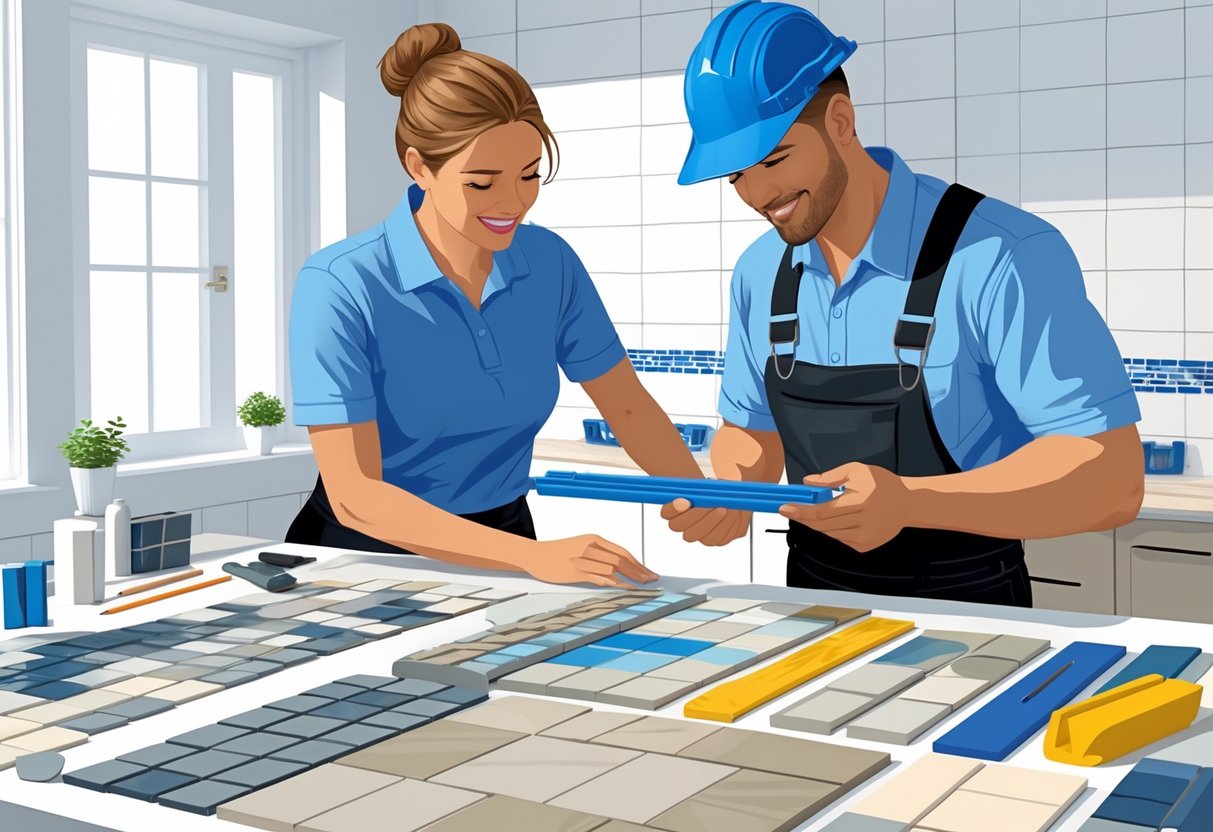Picking the right tile installation company can make or break your home renovation project. A skilled contractor can transform your space with beautiful, long-lasting results.
On the other hand, a poor choice might lead to costly repairs and a fair bit of frustration down the road.

The key to finding the best tile installer is evaluating their experience, credentials, and past work quality before making your decision. Professional installers know how to prep surfaces, use quality materials, and follow industry best practices so your tiles look great for years.
This guide will walk you through spotting qualified contractors and what to ask them. You’ll also get tips on comparing bids so you actually get the best value for your investment.
Need a Home Fix – Emergency or Routine?
From leaks and no-heat nights to simple tune-ups, our 24/7 hotline connects you with trusted local pros in minutes.
Key Takeaways
- Check the contractor’s credentials, insurance, and past work examples before hiring
- Read customer reviews and contact previous clients to verify work quality
- Compare multiple bids while focusing on materials, methods, and total project value
Understanding Tile Installation Services
Tile installation services cover a range of projects, using different materials and techniques. Quality work always means proper prep, up-to-date skills, and attention to detail.
Types of Tile Installation Projects
Most tile companies take on three main types of jobs. Residential projects include kitchens, bathrooms, entryways, and living spaces.
These jobs usually focus on good looks and daily durability. Commercial projects cover offices, restaurants, retail stores, and hotels—places where materials need to handle heavy foot traffic and meet code.
Large-scale construction projects involve new buildings, apartments, or industrial facilities. These need careful scheduling and lots of material at once.
Floor tile installation is probably the most common request. Wall tiles, backsplashes, and shower surrounds are also big parts of the business.
Each project type calls for different skills and tools. Residential work is all about design details, while commercial jobs demand toughness and quick turnarounds.
Common Materials and Techniques
Installers work with a bunch of different tile types. Ceramic tiles are affordable and easy to keep clean.
Porcelain tiles are tougher and more water-resistant. Natural stone tiles like marble, granite, and travertine need special care and handling.
Glass tiles are a bit tricky—they require careful cutting and the right adhesives. Installation techniques depend on the material and where it’s being used.
Wet-set installation uses cement-based adhesives, which are common for ceramic and porcelain. Dry-set installation is often better for natural stone to avoid staining.
Proper substrate preparation is a must. That means leveling floors, waterproofing wet areas, and making sure everything’s structurally sound.
Modern installers use laser levels, wet saws, and other specialized tools. These help keep lines straight and cuts precise, which really shows in the finished product.
What Makes a Quality Tile Installation
Quality starts with solid planning and accurate measurements. Good installers check the substrate and pick the right materials for each job.
Consistent spacing and alignment are dead giveaways of professional work. Uniform grout lines and level tiles make a big difference.
Proper adhesive application is key for avoiding future headaches. The right adhesive, in the right amount, on the right surface—sounds simple, but it’s easy to mess up.
Complete waterproofing in wet areas is non-negotiable. That means proper membranes and sealed penetrations around fixtures.
Quality work follows industry standards from groups like the Tile Council of North America. These standards cover everything from prepping the surface to how you grout.
The finished job should look good and last. Good installers clean up excess grout, seal natural stone, and give you maintenance instructions so your tiles stay sharp.
Identifying Qualified Tile Installation Companies
Finding the right tile company means checking certifications, understanding industry standards, and looking at their work history. Credentials and real-world experience matter way more than a flashy ad.
Tile Installer Certifications and Training
A certified tile installer brings specialized skills to the table. The Ceramic Tile Education Foundation (CTEF) offers the most respected certification around.
CTEF certification means an installer has passed both written and hands-on tests. These cover installation methods, materials, and tools—basically, the things that matter.
Look for installers with these credentials:
- CTEF Certified Tile Installer – Basic certification
- Advanced Certifications – For more complex jobs
- Ongoing Education – Shows they’re keeping up with new methods
Many companies use both certified and non-certified workers. Ask who on the crew holds certifications, and don’t be shy about requesting proof.
Some installers also have trade school or apprenticeship certificates. Those are a bonus, showing they’ve had formal training.
Industry Standards and Organizations
The tile industry has strict standards for quality. The Tile Council of North America (TCNA) sets the guidelines that pros follow.
TCNA standards cover everything from prepping the substrate to picking adhesives and setting tile spacing. Following these standards means your installation should last for decades.
Good contractors stay active in organizations like:
- Tile Council of North America (TCNA)
- National Tile Contractors Association (NTCA)
- Ceramic Tile Education Foundation (CTEF)
Companies involved in these groups show they care about quality. They keep up with new training and techniques.
Ask contractors about their memberships and training. If they’re proud of it, they’ll tell you all about it.
Importance of Experience and Proven Track Record
Experience really does matter more than just finding the lowest price. Skilled installers know how to avoid the mistakes that cause cracked tiles or water leaks.
Look for contractors with at least five years of experience. They should have completed projects like yours in both size and complexity.
Ask for references from recent customers. Actually call those references and ask about quality, timeliness, and professionalism.
If you can, check out some finished projects in person. Online reviews also help—look for patterns, not just one-off complaints.
A strong track record usually includes:
- Portfolio of completed work
- Customer testimonials
- Business longevity
- Insurance and bonding
Experienced contractors are better at handling surprises during installation. They know how to work with different surfaces and fix issues on the fly.
Evaluating Credentials and Professionalism

Checking a tile installer’s credentials is a must for quality work and peace of mind. The big things to look for: proper licensing, active insurance, and membership in respected professional organizations.
Licensing and Insurance Verification
A legit tile contractor needs the right license for your area. Most states require a valid license before anyone can legally install tile, so always ask to see it and double-check with your state’s licensing board.
General liability insurance protects you if anything goes wrong during the job. Workers’ compensation covers the crew if someone gets hurt. Both are non-negotiable for any pro installer.
Smart homeowners always ask for proof of insurance before work starts. It’s a good idea to call the insurance company to confirm the coverage is active, since expired certificates do happen.
Bonding is an extra layer of protection if the contractor doesn’t finish the job right. Bonded contractors have financial backing to fix mistakes or complete unfinished work.
Membership in Professional Organizations
The Ceramic Tile Education Foundation (CTEF) offers respected certification programs. Their Certified Tile Installer (CTI) program tests real-world skills and knowledge of industry standards.
CTI-certified installers have actually passed hands-on tests—so you know they’re not just talk. You can even search for certified installers on the CTEF website.
Other organizations include local tile and flooring associations. These groups set standards and offer training on new techniques and materials.
Membership in these groups shows the contractor is serious about their craft. Plus, it gives them access to ongoing education.
Reputation and Better Business Bureau Ratings
The Better Business Bureau (BBB) tracks complaints and rates contractors. An A+ rating means few complaints and good service, but not every great contractor is a BBB member.
Online reviews on Google, Yelp, and Angie’s List are also helpful. Look for trends in the feedback, not just one-off issues—lots of complaints about missed deadlines or sloppy work are a red flag.
References from recent customers are worth their weight in gold. Good installers should easily give you three recent references, and you should actually call them to ask about the work and overall experience.
Local contractors often have reputations in the community. Word-of-mouth from neighbors, friends, or local suppliers can be surprisingly helpful.
Assessing Workmanship and Project Portfolio
A tile installation company’s project portfolio really shows what they’re capable of. The quality of their past work gives you a sense of how they handle tough jobs and whether their results actually last.
Portfolio Review and Site Visits
Any tile installer worth your time should have a portfolio of finished jobs. This gives you a real sense of their skills and how much they care about the details.
Look for photos that actually show clean grout lines, straight tiles, and a nice, even finish. If you’re thinking about floor work, ask to see their flooring installs.
For backsplashes, check out their wall tile projects. Don’t be shy about asking for examples that are close to what you want done.
Get contact info for recent clients. If a company is proud of their work, they’ll share references without hesitation.
Call a couple of those references. Ask them about the quality of work, if the crew showed up on time, and how the cleanup went.
Try to schedule a site visit to see finished projects in person. Photos can be deceiving, and you’ll catch things in real life that just don’t show up in pictures.
Keep an eye out for:
- Straight grout lines
- Even tile spacing
- Clean corners and edges
- No cracked or wobbly tiles
Quality of Past Tile Projects
When you’re looking over past work, focus on the technical stuff. Tiles should be flat—no weird bumps or dips.
The grout should look even and have the same color all the way through. In bathrooms and kitchens, check for waterproofing.
If you see water damage near tubs or sinks, that’s a big red flag. Corners, outlets, and fixtures are tricky spots—good installers make clean cuts and tight fits there.
Sloppy work shows up fast in those areas. Ask about their warranty policies—companies that stand by their work usually offer longer warranties.
Before-and-after photos are helpful too. They show you how the installer handles challenges and manages a whole project.
Types of Tiles and Applications
Not all tiles are created equal, and different materials need different techniques. Natural stone isn’t installed the same way as ceramic or porcelain.
Make sure the installer has actually worked with your chosen material. Large tiles (over 12 inches) need special tools and a careful touch.
If you’re going with big tiles, ask for examples of similar work. Here’s a quick look at what different jobs require:
| Application | Key Skills Needed |
|---|---|
| Bathroom floors | Waterproofing, proper slope |
| Kitchen backsplashes | Precise cuts around outlets |
| Shower walls | Waterproofing, corner work |
| Outdoor patios | Weather resistance, drainage |
Some installers stick to basics, while others are up for fancy patterns or high-end materials. Try to match their expertise to what you actually need.
Reviewing Materials and Installation Practices

A good tile company should know their materials inside out. They should be able to explain why they’d use one tile or adhesive over another for your space.
Ask how they figure out what works best for your job. If it’s a bathroom, they should talk about moisture and waterproofing.
Selection of Tile and Supporting Materials
Pro installers look at the project area before suggesting tiles. They think about moisture, how much traffic the area gets, and what’s underneath.
Floor tiles need different backing than wall tiles. A quality company will have several adhesive types on hand and pick what’s right for each job.
Porcelain and natural stone don’t use the same adhesives. Here’s what they should be considering:
- Substrate prep materials
- Waterproof membranes for wet spots
- Proper thinset mortars
- Leveling compounds if needed
Ask the contractor why they picked certain materials. If they focus on durability and performance, that’s a good sign they’re following industry best practices.
Grout Joint and Grout Color Expertise
Grout joints matter more than you might think. Large tiles need different spacing than small ones, and wet areas have their own rules.
Common grout joint sizes:
- 1/16 inch for rectified tiles
- 1/8 inch for most ceramic tiles
- 3/16 inch for natural stone
Choosing grout color isn’t just about looks—light grout gets dirty fast, dark grout can make tiles look smaller. The installer should help you weigh the options.
There are different grout types too. Epoxy grout is great for showers, while cement-based grout is fine for most floors. The right choice depends on your project.
Understanding the Installation Process
Quality installers have a system. They start with prepping the surface—making sure it’s level and clean.
Typical steps:
- Prep and clean the surface
- Plan and mark the layout
- Apply adhesive
- Set and adjust tiles
- Grout and clean up
Ask how they check their work as they go. Are they using the right tools? Do they check alignment often?
Talk about timing, too. How long do adhesives need to cure? When do they grout? A good installer will be upfront about the schedule and explain why timing matters.
Checking References and Customer Reviews
What past clients say really tells you what you’re in for. Online reviews and real conversations with former customers offer honest details about the installer’s work and service.
Speaking With Past Clients
Solid tile installers won’t hesitate to give you references. Talking with past clients gives you the inside scoop—no filters.
Don’t just ask if they were happy. Get specifics: Did the crew show up on time? Was the place kept clean? How was the communication?
Questions to ask:
- Was the job finished on schedule?
- Did the cost match the quote?
- How did they handle surprises?
- Would you hire them again?
Listen for details about prep work, materials, and how well they cleaned up. These little things add up.
Online Reviews and Testimonials
Don’t just stick to one site—check Google, Yelp, and the BBB for consistent feedback. Look for reviews that mention specific jobs and issues, not just “Great work!”
Recent reviews matter most. Tile companies can change over time, so focus on feedback from the last year or so.
Review sites worth checking:
- Google My Business
- Yelp
- Angie’s List
- Better Business Bureau
- Facebook Business Pages
Red Flags to Avoid
Some warning signs should make you run the other way. If someone’s knocking on doors for work, that’s weird—pros usually get jobs through referrals or normal advertising.
Never pay everything upfront. Good installers ask for a fair deposit and set up payments as work progresses.
If they can’t give you local references or have no online presence, that’s a problem. Established pros will have both.
Big red flags:
- Cash-only payments
- No license or insurance
- Only verbal estimates
- High-pressure sales tactics
- No local business address
Comparing Bids and Making the Final Decision
Getting a few bids is smart, but cheapest isn’t always best. You want the best value and someone who stands behind their work.
Evaluating Price vs. Value
Don’t pick based on price alone. If a bid is way lower than others, something’s probably missing—or corners will be cut.
See what’s actually included. Some bids cover prep and cleanup; others tack those on later. Look at the brands and types of materials, too.
Compare:
- Labor rates
- Material quality and brands
- Prep and cleanup
- Permits and disposal fees
A slightly higher price might mean better tiles or more careful prep. That can save you headaches (and money) down the road.
Push for a detailed breakdown. Vague estimates make it tough to know what you’re actually paying for.
Warranty and Service Guarantees
Warranties say a lot. Most good installers offer at least a year on their work; some give more for certain problems.
Check what’s covered—labor, materials, specific issues, response time for fixes. Ask how they handle claims if something goes wrong.
Warranty details to look for:
- Length of coverage
- What’s actually included
- Labor and material coverage
- How quickly they respond
Some companies even guarantee their timeline or offer penalties if they’re late. That’s a sign they’re confident in their schedule.
Clarifying Project Timeline and Expectations
Get clear dates up front. Each installer should tell you when they’ll start and finish, and what might cause delays.
Ask about weather, material delivery, or prep work that could slow things down. Here are a few timeline questions worth asking:
- How long will the install take?
- When can you start?
- What could cause delays?
- How much notice do you need for changes?
Talk about the daily schedule, too. Some crews work long days, others split it up. Make sure you know what to expect for prep, cutting, grouting, and cleanup.
Get those dates and promises in writing. Verbal agreements are easy to forget—or argue about—later.
Frequently Asked Questions
Picking the right tile installer takes a little digging. You’ll want to check credentials, compare prices, and make sure they follow the rules before you decide.
What should I consider when selecting a professional tile installation company?
Experience is huge. Companies with years of tile work under their belt have seen it all and know how to handle tricky materials or layouts.
Reputation matters, too. Read reviews, ask for references, and check their BBB standing. Insurance protects you if something goes wrong—make sure they have both liability and workers’ comp.
Licensing is non-negotiable. Double-check with your local board that they’re current and legit before signing anything.
What criteria can I use to evaluate the reliability of a tile installer?
Look at their portfolio—especially projects like yours. That gives you a sense of their standards and attention to detail.
Talk to a few recent clients. Ask about work quality and professionalism. Fast response times are a good sign—they usually mean better communication all around.
Warranties show confidence. Reliable installers back up both their materials and labor with written guarantees for a reasonable period.
How do I compare costs and get an estimate for tile installation?
Getting several quotes is honestly the best way to figure out what’s fair. Try to snag detailed estimates from at least three licensed contractors so you can really compare what you’re getting for your money.
Any written estimate should spell out material costs, labor charges, and extra fees. If a contractor only offers a verbal estimate or dodges questions about their pricing, that’s usually a red flag.
Most tile installation quotes are based on square footage. Measure your space as accurately as possible, or better yet, let the contractors handle it for you so the estimate’s actually useful.
There’s almost always some surprise cost lurking in renovation projects. Make sure you ask about potential extra charges—things like prepping the surface, material waste, or other hiccups that might pop up.
What qualifications or certifications should a reputable tile installation company have?
Certifications matter—they show real technical know-how. It’s worth checking if your contractor is certified by groups like the Ceramic Tile Education Foundation or the National Tile Contractors Association.
Some manufacturers offer their own training programs, which means your installer knows the ins and outs of specific products. That’s not a bad thing to ask about.
Formal training, like trade school or an apprenticeship, usually means the installer’s picked up proper techniques. Don’t be shy—ask about their education and how they learned the trade.
Contractors who keep learning and go to industry events show they care about doing things right. That’s the kind of commitment you want, honestly.
How do I ensure the tile installation company I choose adheres to industry standards?
The Tile Council of North America (TCNA) sets the gold standard for installation practices. Check that your contractor actually follows their guidelines, especially for prepping the surface and the methods they use.
Following local building codes is non-negotiable. A licensed contractor should know the rules and make sure all permits and safety requirements are in order.
Using the right materials is huge if you want your tiles to last. Double-check that your installer’s using adhesives, grouts, and sealers that fit your particular tile and the room it’s going in.
Quality control isn’t just a buzzword—it’s about real checks along the way. Ask how your contractor handles inspections and what steps they take to keep the work up to snuff.
What are the essential questions to ask a tile installer before hiring them?
It’s smart to ask about the project timeline right up front. When can they start, and how long do they expect the job to take?
Don’t forget to ask about anything that could delay the installation. Life happens, so it’s good to know what might slow things down.
Material sourcing can get confusing fast. Will the contractor pick up the tiles and supplies, or is that on you?
If you need to buy things yourself, get that in writing. No one likes last-minute surprises at the hardware store.
Cleanup is another biggie. Will they tidy up each day, or is your living room about to become a construction zone?
And what about the final cleanup? Make sure everyone’s on the same page before any work begins.
Problems pop up, even with the best planning. How does the contractor handle unexpected issues or change orders?
Ask about warranties and what happens if something goes wrong after the job’s done. It’s better to know now than to scramble later.







Leave a Reply